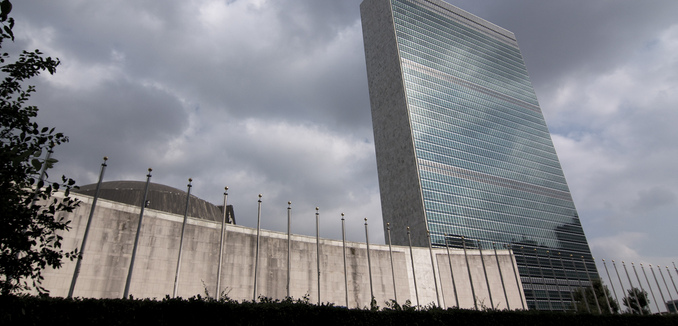When Syria ascended to the role of presidency of the United Nations Conference on Disarmament for one month on Monday, Robert Wood, the United States ambassador to the conference, called it “one of the darkest days in the history of the Conference on Disarmament.”
The week at the U.N. did not get better.
Syria assumed the role of presidency of the conference, despite committing the war crime of deploying chemical weapons against civilians, by virtue of its place in the alphabet — it followed Switzerland. The New York Times explained that the reason for the rotating scheme was “to prevent major powers dominating the forum.”
The problem is that the U.N., according to its charter, was founded, in part, to “save succeeding generations from the scourge of war, which twice in our lifetime has brought untold sorrow to mankind.”
How does giving a regime that uses prohibited weapons presidency over a conference devoted to abrogating such weapons save anyone from “the scourge of war?”
As the Times subsequently pointed out, Syria only agreed to join the 1993 Chemical Weapons Convention, one of the treaties authored by the conference that prohibits the manufacturing, stockpiling, and use of chemical weapons, AFTER the regime was found to have used sarin in a 2013 attack on a Damascus suburb that killed 1,400 people.
Even once Syria joined the treaty, investigators have documented more than 30 additional chemical weapons attacks carried out by the Syrian government.
The idea that major powers shouldn’t dominate a U.N. conference may be reasonable. However, there should be some way to police who serves or presides over conferences based on their records. That Syria, which violated one of the primary objectives of the Disarmament Conference — the banning of chemical weapons — should preside over the conference is a travesty.
Syria was not the only bad actor to avoid the consequences of its actions this week at the U.N. On Wednesday, Hamas, the Iran-backed terrorist organization, was spared a U.N. Security Council statement condemning the latest barrage of rockets and mortars fired into Israel from the Gaza Strip.
The U.S. Ambassador to the U.N. Nikki Haley responded to Kuwait’s veto, saying that condemning Hamas for firing rockets at civilians should have been a “no-brainer.”
“Apparently, some Council members did not think Hamas launching rockets qualified as terrorism,” she added. “The United States begs to differ.”
Again, if we look at the U.N. charter, one the goals stated is “to ensure, by the acceptance of principles and the institution of methods, that armed force shall not be used.” How does letting a terrorist group firing rockets and mortars at civilians without, at least, condemnation reinforce the message that “armed force shall not be used?”
If the U.N.’s week was marked by letting human rights abusers and terrorists off the hook, how could it be worse? Because European diplomats decided that Israel, the Middle East’s only democracy, should continue to be singled out for special scrutiny and inevitable condemnation by the misnamed United Nations Human Rights Council (UNHRC).
Colum Lynch reported Wednesday for Foreign Policy that unnamed “key European allies” would not support a U.N. General Assembly vote to remove UNHRC’s notorious Agenda Item 7, which singles out Israel — the only nation so treated — for special scrutiny by the council.
Lynch described the motivation of the European diplomats, who are concerned that the U.S. initiative “could inflict long-lasting damage to the world’s principal human rights agency and undermine efforts to expose human rights violations elsewhere.”
But Lynch also observed that the council was formed in 2006 to replace “the U.N. Commission on Human Rights, whose credibility had been tainted by the presence of member states with abysmal rights records.”
Currently, as UN Watch has documented, the new, “improved” council has such gross human rights violators Qatar, Pakistan, DR Congo, Afghanistan, Saudi Arabia, Burundi, China, Cuba, Venezuela, and UAE, to the council violating the “UN’s own basic membership criteria.”
It’s hard to understand Europe’s concern about the possible “long-lasting damage” to the council when it appears that it is just as tainted with human rights abusers as its discredited predecessor was.
Agenda Items 7 doesn’t just single out Israel for scrutiny, it effectively prejudges Israel as guilty in any violence with the Palestinians. Given that Israel is the only nation singled out, it also makes the agenda item discriminatory and anti-Semitic. Whichever European nations refused to support the U.S. initiative should have done so even if there wasn’t their misplace concern about damage to the council.
To refer again to the U.N.’s charter, the founders said that the goal of the organization is promoting “equal rights of men and women and of nations large and small.” A provision that singles out one nation — especially a free nation — for extra scrutiny and condemnation violates this vision of equal rights for all nations.
By allowing Syria to assume the presidency of its Conference on Disarmament, the U.N. experienced a dark day. By subsequently refusing to condemn Hamas, and leaving Israel open to even more unjust vilification, the U.N. has darkened itself even further.
[Photo: Christopher Neugebauer / Flickr ]




